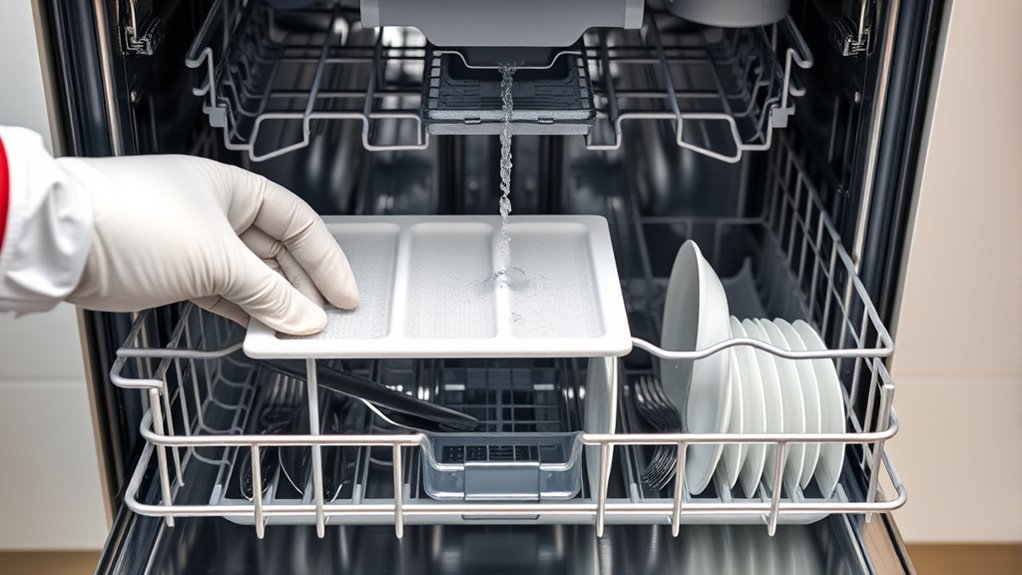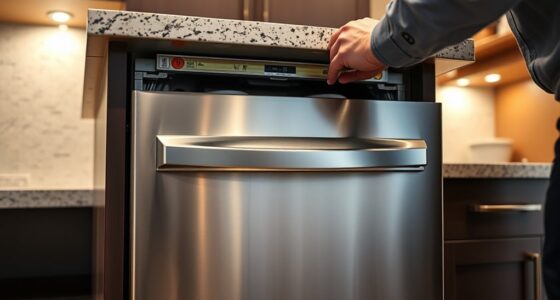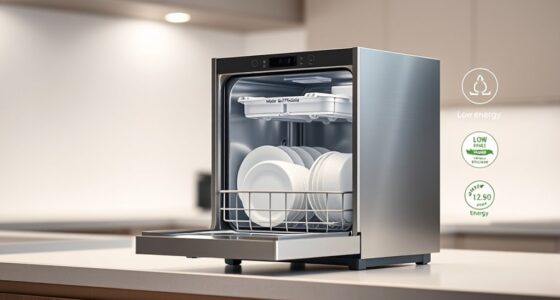To keep your compact dishwasher in top shape, clean the filter and spray arms regularly and run a vinegar or dishwasher cleaner cycle monthly to remove soap scum and mineral buildup. Use the right detergent and make certain your water is softened if needed to prevent mineral deposits. Properly load dishes and check for clogs to maintain efficiency. Keep your machine maintained, and you’ll extend its lifespan—learn more about effective maintenance tips as you continue.
Key Takeaways
- Regularly clean the detergent dispenser and filters to prevent residue buildup and ensure proper operation.
- Run periodic dishwasher cleaning cycles with vinegar or specialized cleaners to remove soap scum and mineral deposits.
- Check water hardness levels and use water softeners or rinse aids to prevent mineral buildup and improve cleaning.
- Avoid overloading the dishwasher, ensuring proper placement of dishes for effective water and detergent coverage.
- Use eco-friendly or low-phosphate detergents, and follow manufacturer guidelines for detergent types and quantities.

Keeping your compact dishwasher in top shape guarantees it cleans effectively and lasts longer. One of the most essential aspects of maintenance involves understanding the right detergent types to use. There are several options available, from powder and gel to tablet forms, each with their advantages. Powder detergents are often budget-friendly and effective for heavy-duty cleaning, but they can leave residues if not rinsed properly. Gel detergents dissolve well in water, reducing residue buildup, while tablets offer convenience and pre-measured doses, minimizing waste and ensuring consistent cleaning power. Choosing the correct detergent type for your dishwasher helps prevent issues like clogs or poor cleaning performance. Additionally, water softening plays a crucial role in maintaining your dishwasher’s efficiency. Hard water contains minerals like calcium and magnesium, which can cause mineral buildup on the dishwasher’s internal parts, leading to decreased performance and potential damage over time. To combat this, consider installing a water softener or using a dishwasher-specific water conditioner. These systems help reduce mineral content, ensuring your dishwasher operates smoothly and prolongs its lifespan. If you live in an area with hard water, using a rinse aid can also improve water sheeting and drying, preventing spots and film on your dishes. Regularly checking the water hardness level and adjusting your approach accordingly ensures optimal results. When it comes to detergent types and water softening, it’s essential to follow your manufacturer’s recommendations for your specific model. Using the wrong detergent or neglecting water softening can lead to soap scum, mineral deposits, and inefficient cleaning. It’s also helpful to run a cleaning cycle with a dishwasher cleaner or vinegar periodically. This clears out soap scum, grease, and mineral buildup that might not be visible but can impair cleaning performance. Remember to keep the detergent dispenser clean and free of residue, which can prevent proper detergent release. Proper loading is equally crucial — avoid overstuffing your dishwasher, as this can block water and detergent from reaching all surfaces. Furthermore, opting for environmentally friendly or low-phosphate detergents can be gentler on your machine and the environment while still providing effective cleaning. Additionally, understanding the importance of water softening can significantly improve your dishwasher’s lifespan and efficiency. Combining the right detergent types with effective water softening practices will help your compact dishwasher perform at its best. Regular maintenance, including checking for clogs, cleaning filters, and using suitable detergents, ensures your dishwasher remains efficient and durable. By paying attention to these details, you’ll keep your appliance running smoothly, providing spotless dishes every time without unnecessary repairs or early replacement.
Frequently Asked Questions
How Often Should I Replace the Dishwasher’s Filter?
You should replace your dishwasher’s filter every 3 to 6 months, depending on usage and water quality. Regular filter maintenance helps keep your dishwasher running efficiently and prevents odors. If you notice clogs, reduced cleaning performance, or unusual smells, it’s time for a replacement. Keeping to this replacement frequency guarantees your dishwasher stays in top shape and continues to effectively clean your dishes.
Can I Use Regular Dishwasher Cleaner on Compact Models?
In the days of dial-up internet, you’d probably think regular dishwasher cleaner works fine, but for compact models, it’s a different story. You can’t always assume cleaner compatibility; some formulas might damage your appliance. Always check the manufacturer’s instructions first. For effective compact cleaning, choose a cleaner specifically designed for small dishwashers. This ensures your machine stays in top shape without risking leaks or damage.
What Are Signs My Compact Dishwasher Needs Professional Repair?
You should call a professional if your compact dishwasher shows leaking issues or makes strange noises. Leaks can indicate worn-out seals or clogged hoses, while unusual sounds might mean motor or pump problems. Ignoring these signs can lead to bigger damage. Trust a repair expert to diagnose and fix the issue safely, preventing further costly damage and ensuring your dishwasher operates efficiently again.
Is It Safe to Use Vinegar for Cleaning the Dishwasher?
Vinegar’s importance for venturing into dishwasher cleaning is quite common, but is it safe? Yes, cleaning with vinegar is generally safe for your compact dishwasher when used properly. Just avoid overdoing it, as too much vinegar can corrode components over time. Use a cup of white vinegar on the top rack and run a hot cycle. This simple solution helps keep your dishwasher fresh and functioning flawlessly without risking damage.
How Do I Troubleshoot Water Drainage Problems?
To troubleshoot water drainage problems, start by inspecting the drain hose for kinks, clogs, or obstructions, ensuring it’s properly connected. Next, run pump malfunction diagnostics by listening for unusual noises or testing the pump’s operation. If the pump isn’t working correctly, it may need cleaning or replacement. Clearing blockages and checking these components usually resolve drainage issues, helping your dishwasher drain effectively.
Conclusion
Keeping your compact dishwasher clean and well-maintained ensures it runs efficiently for years. Regularly inspecting and cleaning filters, spray arms, and seals can cut down on energy use and prevent odors. Did you know that a dirty dishwasher can use up to 50% more energy? By following simple maintenance tips, you’ll save money and extend your appliance’s lifespan. Stay on top of cleaning, and your dishwasher will stay in top shape, making your kitchen chores easier.






